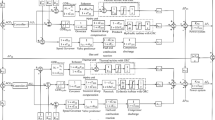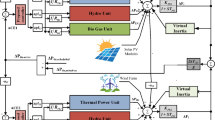Abstract
Teaching–learning-based optimisation (TLBO) is an emerging gradient-free optimisation algorithm inspired by interactions between students and teacher in classrooms. TLBO has no control parameter to be tuned by user. This property makes it popular in research community. It has been successfully applied to challenging optimisation problems in different areas. In this study, TLBO is assisted to find optimal setting of thyristor-controlled series compensators in electric power systems. The experiments have been done for both N-1 and N-2 line outage contingencies. The results show that TLBO performs well in solving this problem.


Similar content being viewed by others
References
Jordehi AR, Jasni J (2011) A comprehensive review on methods for solving FACTS optimization problem in power systems. Int Rev Electr Eng 6(4):1916–1926
Jordehi AR, Jasni J (2012) Approaches for FACTS optimization problem in power systems: In power engineering and optimization conference (PEDCO) Melaka, Malaysia, 2012 IEEE International. IEEE
Rezaee Jordehi A et al (2013) Particle swarm optimisation applications in FACTS optimisation problem. In Power Engineering and Optimization Conference (PEOCO), 2013 IEEE 7th International. 2013. IEEE
Hingorani NG, Gyugyi L, El-Hawary M (2000) Understanding FACTS: concepts and technology of flexible AC transmission systems. Vol. 1. IEEE press, New York
Jordehi Rezaee A et al (2005) Enhanced leader PSO (ELPSO): a new algorithm for allocating distributed TCSC’s in power systems. Int J Electr Power Energy Syst 64:771–784
Jordehi R (2011) Heuristic methods for solution of FACTS optimization problem in power systems. 2011 IEEE student conference on research and development
Jordehi AR, Jasni J (2013) Particle swarm optimisation for discrete optimisation problems: a review. Artif Intell Rev 1–16 (in press)
Jordehi AR, Joorabian M (2011) Optimal placement of Multi-type FACTS devices in power systems using evolution strategies. power engineering and optimization conference (PEOCO), 2011 IEEE 5th International
Jordehi AR (2014) Particle swarm optimisation for dynamic optimisation problems: a review. Neural Comput Appl 1–10
Jordehi AR (2014) A chaotic-based big bang-big crunch algorithm for solving global optimisation problems. Neural Comput Appl (in press)
Ahandan MA, Alavi-Rad H, Jafari N (2013) Frequency modulation sound parameter identification using shuffled particle swarm optimization. IJAEC 4(4):62–71
Ahandani MA, Alavi-Rad H (2014) Opposition-Based learning in shuffled frog leaping: an application for parameter identification. Inf Sci (in press)
Ahandani MA, Alavi-Rad H (2012) Opposition-based learning in the shuffled differential evolution algorithm. Soft Comput 16(8):1303–1337
Rezaee Jordehi A, Jasni J (2013) Parameter selection in particle swarm optimisation: a survey. J Exp Theory Artif Intell 25(4):527–542
Rao RV, Patel V (2013) Multi-objective optimization of heat exchangers using a modified teaching-learning-based optimization algorithm. Appl Math Model 37(3):1147–1162
Venkata Rao R, Kalyankar V (2013) Parameter optimization of modern machining processes using teaching–learning-based optimization algorithm. Eng Appl Artif Intell 26(1):524–531
Martín García JA, Gil Mena AJ (2013) Optimal distributed generation location and size using a modified teaching–learning based optimization algorithm. Int J Electr Power Energy Syst 50:65–75
Roy PK, Bhui S (2013) Multi-objective quasi-oppositional teaching learning based optimization for economic emission load dispatch problem. Int J Electr Power Energy Syst 53:937–948
Satapathy SC, Naik A, Parvathi K (2012) 0–1 integer programming for generation maintenance scheduling in power systems based on teaching learning based optimization (TLBO). In: Contemporary computing. Springer, p 53–63
Singh M, Panigrahi B, Abhyankar A (2013) Optimal coordination of directional over-current relays using teaching learning-based optimization (TLBO) algorithm. Int J Electr Power Energy Syst 50:33–41
Roy PK (2013) Teaching learning based optimization for short-term hydrothermal scheduling problem considering valve point effect and prohibited discharge constraint. Int J Electr Power Energy Syst 53:10–19
Sultana S, Roy PK (2014) Optimal capacitor placement in radial distribution systems using teaching learning based optimization. Int J Electr Power Energy Syst 54:387–398
Niknam T, Massrur HR, Firouzi BB (2012) Stochastic generation scheduling considering wind power generators. J Renew Sustain Energy 4(6):063119
Rao R, Savsani V, Vakharia D (2011) Teaching–learning-based optimization: a novel method for constrained mechanical design optimization problems. Comput Aided Des 43(3):303–315
Rao R, Savsani V, Vakharia D (2012) Teaching–learning-based optimization: an optimization method for continuous non-linear large scale problems. Inf Sci 183(1):1–15
Pai MA (1979) Computer techniques in power system analysis. Tata McGraw-Hill Publishing Company, Nodia
Kuhn HW (2014) Nonlinear programming: a historical view, in traces and emergence of nonlinear programming. Springer, Berlin, pp 393–414
Lewis RM, Torczon V (1999) Pattern search algorithms for bound constrained minimization. SIAM J Optim 9(4):1082–1099
Rashedi E, Nezamabadi-Pour H, Saryazdi S (2009) GSA: a gravitational search algorithm. Inf Sci 179(13):2232–2248
Yang XS (2010) Firefly algorithm, Levy flights and global optimization, in research and development in intelligent systems XXVI. Springer, Berlin, pp 209–218
Author information
Authors and Affiliations
Corresponding author
Rights and permissions
About this article
Cite this article
Rezaee Jordehi, A. Optimal setting of TCSCs in power systems using teaching–learning-based optimisation algorithm. Neural Comput & Applic 26, 1249–1256 (2015). https://doi.org/10.1007/s00521-014-1791-x
Received:
Accepted:
Published:
Issue Date:
DOI: https://doi.org/10.1007/s00521-014-1791-x




